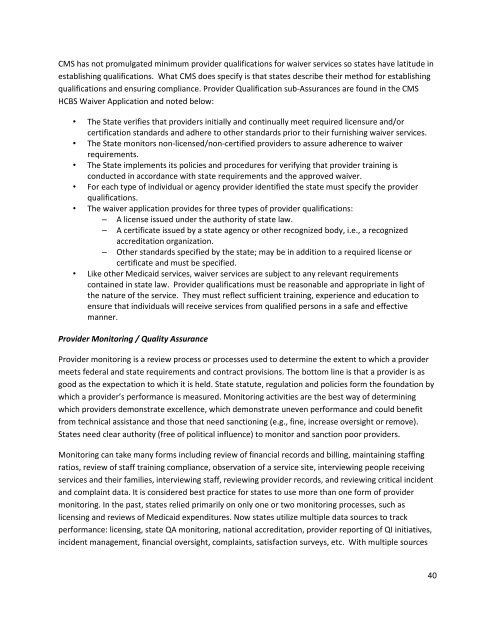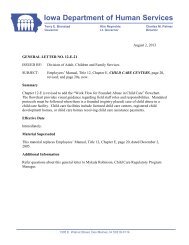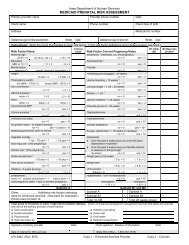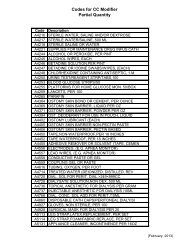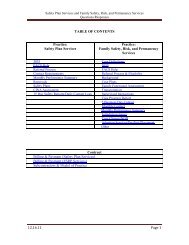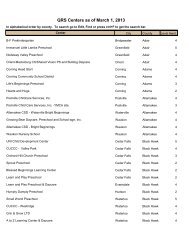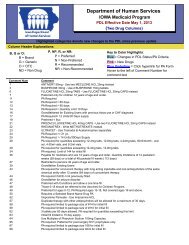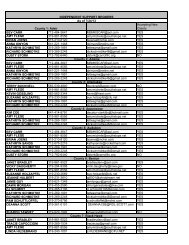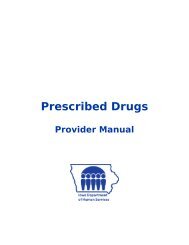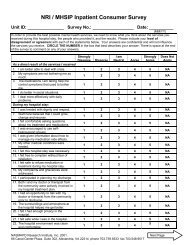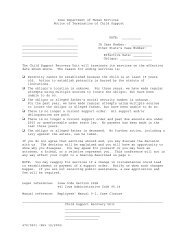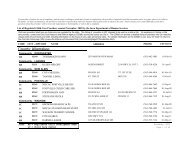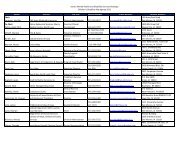Iowa Mental Health and Disability Services System Redesign Interim ...
Iowa Mental Health and Disability Services System Redesign Interim ...
Iowa Mental Health and Disability Services System Redesign Interim ...
- No tags were found...
You also want an ePaper? Increase the reach of your titles
YUMPU automatically turns print PDFs into web optimized ePapers that Google loves.
CMS has not promulgated minimum provider qualifications for waiver services so states have latitude in<br />
establishing qualifications. What CMS does specify is that states describe their method for establishing<br />
qualifications <strong>and</strong> ensuring compliance. Provider Qualification sub-Assurances are found in the CMS<br />
HCBS Waiver Application <strong>and</strong> noted below:<br />
• The State verifies that providers initially <strong>and</strong> continually meet required licensure <strong>and</strong>/or<br />
certification st<strong>and</strong>ards <strong>and</strong> adhere to other st<strong>and</strong>ards prior to their furnishing waiver services.<br />
• The State monitors non-licensed/non-certified providers to assure adherence to waiver<br />
requirements.<br />
• The State implements its policies <strong>and</strong> procedures for verifying that provider training is<br />
conducted in accordance with state requirements <strong>and</strong> the approved waiver.<br />
• For each type of individual or agency provider identified the state must specify the provider<br />
qualifications.<br />
• The waiver application provides for three types of provider qualifications:<br />
– A license issued under the authority of state law.<br />
– A certificate issued by a state agency or other recognized body, i.e., a recognized<br />
accreditation organization.<br />
– Other st<strong>and</strong>ards specified by the state; may be in addition to a required license or<br />
certificate <strong>and</strong> must be specified.<br />
• Like other Medicaid services, waiver services are subject to any relevant requirements<br />
contained in state law. Provider qualifications must be reasonable <strong>and</strong> appropriate in light of<br />
the nature of the service. They must reflect sufficient training, experience <strong>and</strong> education to<br />
ensure that individuals will receive services from qualified persons in a safe <strong>and</strong> effective<br />
manner.<br />
Provider Monitoring / Quality Assurance<br />
Provider monitoring is a review process or processes used to determine the extent to which a provider<br />
meets federal <strong>and</strong> state requirements <strong>and</strong> contract provisions. The bottom line is that a provider is as<br />
good as the expectation to which it is held. State statute, regulation <strong>and</strong> policies form the foundation by<br />
which a provider’s performance is measured. Monitoring activities are the best way of determining<br />
which providers demonstrate excellence, which demonstrate uneven performance <strong>and</strong> could benefit<br />
from technical assistance <strong>and</strong> those that need sanctioning (e.g., fine, increase oversight or remove).<br />
States need clear authority (free of political influence) to monitor <strong>and</strong> sanction poor providers.<br />
Monitoring can take many forms including review of financial records <strong>and</strong> billing, maintaining staffing<br />
ratios, review of staff training compliance, observation of a service site, interviewing people receiving<br />
services <strong>and</strong> their families, interviewing staff, reviewing provider records, <strong>and</strong> reviewing critical incident<br />
<strong>and</strong> complaint data. It is considered best practice for states to use more than one form of provider<br />
monitoring. In the past, states relied primarily on only one or two monitoring processes, such as<br />
licensing <strong>and</strong> reviews of Medicaid expenditures. Now states utilize multiple data sources to track<br />
performance: licensing, state QA monitoring, national accreditation, provider reporting of QI initiatives,<br />
incident management, financial oversight, complaints, satisfaction surveys, etc. With multiple sources<br />
40


